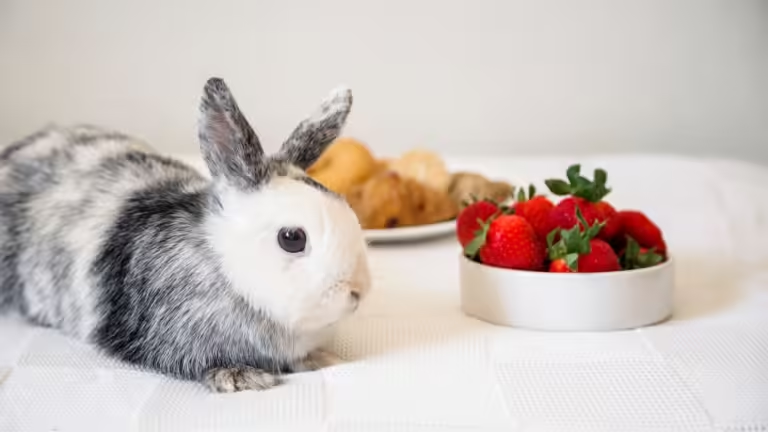Rabbits are charming pets, known for their soft fur and gentle demeanor. However, understanding their dietary needs is crucial for their health and well-being. So, what do rabbits eat? In this comprehensive guide, we will explore the ideal diet for rabbits, ensuring they get all the nutrients they need to thrive.
The Importance of Hay
Hay is the cornerstone of a rabbit’s diet and should make up the majority of their daily food intake. It provides essential fiber that aids in digestion and helps keep their teeth healthy. Rabbits have continuously growing teeth, and chewing on hay helps wear them down to a healthy length.
Types of Hay
- Timothy Hay: Timothy hay is a popular choice among rabbit owners. It is high in fiber and has the right balance of nutrients for adult rabbits.
- Alfalfa Hay: Alfalfa hay is richer in protein and calcium and is suitable for young, growing rabbits or nursing mothers. However, it is not recommended for adult rabbits as it can lead to obesity and other health issues.
- Orchard Grass: Orchard grass is another good option that provides high fiber content and a slightly sweeter taste than timothy hay.
- Meadow Hay: Meadow hay contains a mix of different grasses and plants, offering a varied diet.
Ensure your rabbit has constant access to fresh hay to promote good health. Knowing what rabbits eat, especially the importance of hay, is essential for their well-being.

Fresh Vegetables and Greens
In addition to hay, rabbits should be given a variety of fresh vegetables and greens daily. These provide essential vitamins and minerals and add variety to their diet. Understanding what rabbits eat in terms of vegetables is crucial.
Recommended Vegetables
- Leafy Greens: Romaine lettuce, kale, cilantro, parsley, and spinach are excellent choices. Avoid iceberg lettuce as it has little nutritional value.
- Root Vegetables: Carrots and radishes can be given in moderation due to their high sugar content.
- Other Vegetables: Bell peppers, broccoli, cucumber, and zucchini can also be included.
Introduce new vegetables gradually and in small quantities to avoid digestive issues. Always wash vegetables thoroughly to remove pesticides and other contaminants. Knowing what rabbits eat, including the best vegetables, is key to their health.
Pellets
While hay and vegetables should make up the bulk of a rabbit’s diet, high-quality pellets can be included to provide balanced nutrition. Choose pellets that are high in fiber and low in protein and calcium. Understanding what rabbits eat, including pellets, ensures they get all necessary nutrients.
How Much to Feed
- Adult Rabbits: Feed 1/4 to 1/2 cup of pellets per 5 pounds of body weight daily.
- Young Rabbits: Young rabbits can have unlimited pellets as they are growing and need more nutrients.
Avoid overfeeding pellets as it can lead to obesity and other health issues. Knowing what rabbits eat, and how much, is vital for their health.
Fresh Water
Rabbits need constant access to fresh water. Provide water in a clean bowl or a water bottle designed for rabbits. Ensure the water is changed daily to keep it fresh and clean. Water is a crucial part of what rabbits eat and drink.
Treats
Treats should only be given occasionally and in small quantities. Suitable treats include small pieces of fruit such as apples, bananas, and berries. Avoid sugary and processed treats as they can cause digestive issues and obesity. Treats should be a minimal part of what rabbits eat.
Foods to Avoid
Certain foods are harmful to rabbits and should be avoided entirely. These include:
- Processed Foods: Bread, crackers, and other processed foods can upset a rabbit’s digestive system.
- High-Sugar Fruits: Grapes, raisins, and other high-sugar fruits should be limited.
- Toxic Plants: Some plants, such as tomato leaves, potatoes, and rhubarb, are toxic to rabbits.
Avoiding harmful foods is essential to understanding what rabbits eat safely.
Understanding Rabbit Nutrition
Understanding what rabbits eat is crucial for providing a balanced diet that meets all their nutritional needs. A well-rounded diet will keep your rabbit healthy and happy, preventing common health issues such as obesity, dental problems, and digestive disorders. Knowing what rabbits eat, and ensuring they get the right foods, is the foundation of good rabbit care.
Conclusion
By understanding what rabbits eat and providing a balanced diet, you can ensure your rabbit’s health and happiness. Remember to prioritize hay, include a variety of fresh vegetables, provide high-quality pellets in moderation, and always offer fresh water. Avoid harmful foods and limit treats to keep your rabbit in top condition.
For more information on rabbit care, you can visit reputable sources such as the House Rabbit Society or Rabbit Welfare Association & Fund. Additionally, check out our other articles on rabbit health and behavior.

